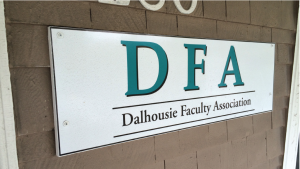Government to make financial arrangements with Dal without having staff, faculty, student representatives at the meeting
Dalhousie faculty, students and staff will be excluded from this year’s Memorandum of Understanding (MOU), where Dal discusses funding arrangements with the province for the next three years.
In response to the exclusion of Dal’s key stakeholders, the Dalhousie Faculty Association (DFA) joined the Nova Scotia Post-Secondary Education Coalition to write a letter to the three major provincial party leaders. The letter asks for students, staff and faculty to be included in the discussion.
The DFA reports that in the past 12 years, Dal has increased its funding towards adding new buildings and administrative costs, yet has cut funding toward faculties. DFA President Catrina Brown says that $130 million of operating funds have gone toward buildings.
“I don’t ever hear students say, ‘I want to go to a university that has really bright, new, shiny buildings,’ ” says Brown.
Brown acknowledges the province has cut funding for the university, but she continues to see cuts toward educational resources, while the university continues to add new buildings every year. Dal opened the LeMarchant Place building this year and is planning to rip down many of the properties along South St. to create a new fitness centre.
Facing cuts, most departments don’t have many tenure positions available. The Faculty of Health Professions contains 40 per cent of the university’s limited-term positions, yet the law school and medical school have more tenure-stream positions.
“Some programs literally just get dwindled out because they’re not considered important enough,” says Brown. “And who makes those decisions, which departments are more important? On what basis? Is it money? Is it the labour force?”
During last year’s library funding model consultations, the Faculty of Arts and Social Sciences (FASS) complained repeatedly that they were being slighted in prioritization. The library consultations for a new funding model have continued in to this year, so its model for last year hasn’t been received. But if it had gone through, FASS would have had their library allocation cut by 43 per cent since 2008/09.
Brown says she believes the reason the Coalition happened was because educators across the province continue to hear that the universities don’t have enough money to properly fund educational resources.
“Teaching and learning are the foundation of Dalhousie University,” says Dal’s senior communications advisor, Janet Bryson, via email. “Listening to our students and faculty is key to the success of our community, especially as we face constrained budgets.”
Brown says that with much of the teaching assigned to limited-term and sessional staff, it takes away the research opportunities that faculty expected to have after completing their PhDs. The university assigns them such a high volume of work that they have no time to devote to research – and they aren’t even paid well.
Intellectual integrity is compromised since the tenure-stream staff are the ones creating the course outlines rather than the ones who are teaching most of the classes. A recent CBC report says half of Canadian undergraduates are taught by limited-term staff.
“You’re not being taught by tenure-stream faculty, you’re paying higher tuition than ever, going increasingly in to debt as you graduate, with bigger class sizes,” says Brown about students. “You’re kind of paying more and getting less.”
This is the first MOU since 2005 that students haven’t been involved in. Usually the MOU includes two student observers.
Before the 2013 provincial election, the Liberal party said in a Students Nova Scotia (SNS) questionnaire that it would include students in post-secondary education related decisions.
“Students have to be part of the conversation when it comes to our post-secondary education system,” reads the Liberals’ response. “We cannot move forward without our students.”
In April 2014, the provincial government cut $35 million from its budget by eliminating the Graduation Retention Rebate, a program introduced in 2009 to keep graduates in Nova Scotia.
“We’re being excluded from being at the table without having violated any agreements,” SNS executive director Jonathan Williams said. “I think we’re going to be taking a lot of steps to push back on this government.”
The government said that it plans to hold focus groups with students, faculty and the public regarding this year’s MOU.
“You start with the issue of what’s happening with money, but in the end, it’s what’s happening with education,” says Brown.
“Leading to the ultimate question of, what is the real direction of post-secondary education? What’s the real direction of the university in terms of education and its core principles and values, which are about education?”


Recent Comments